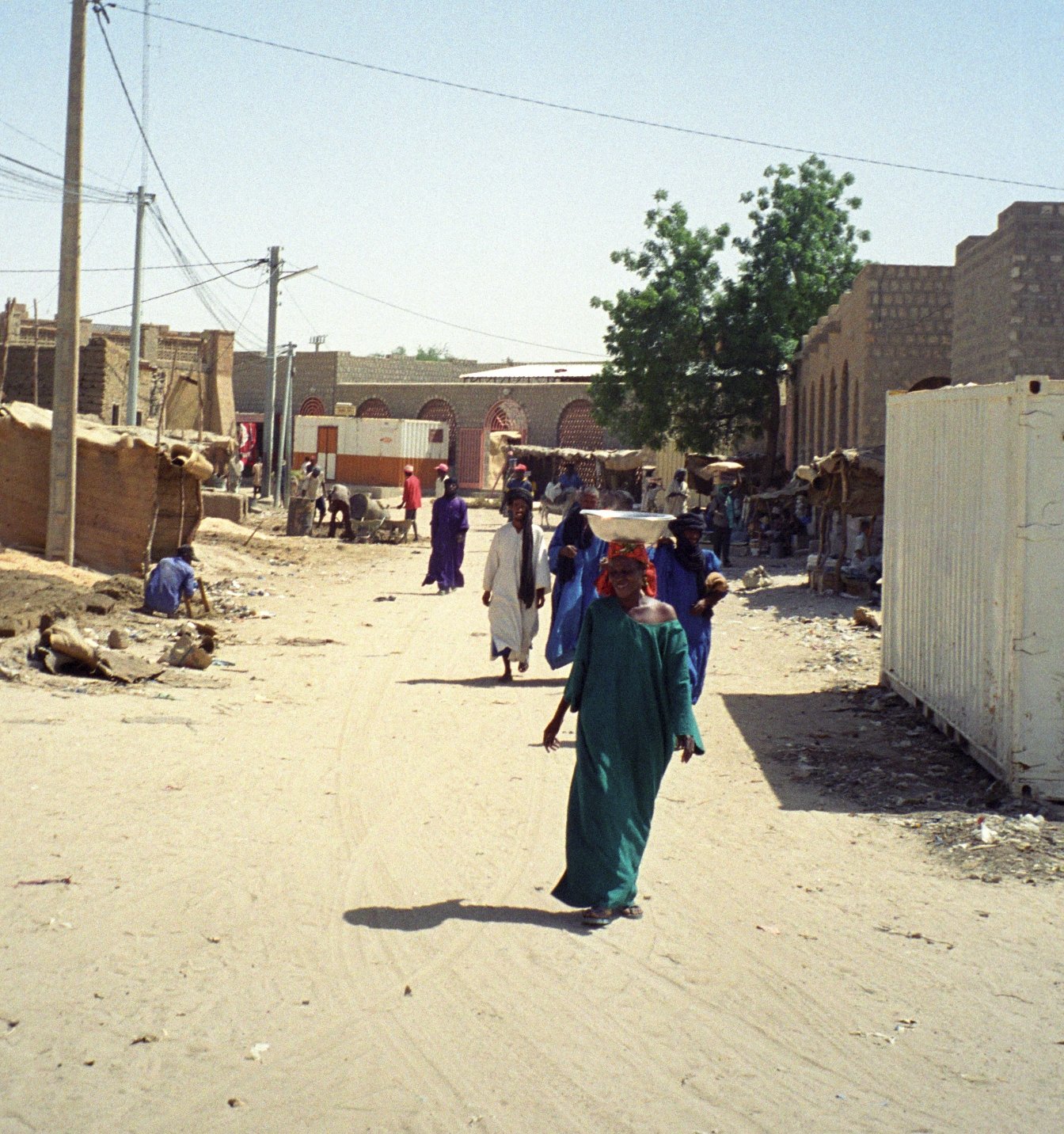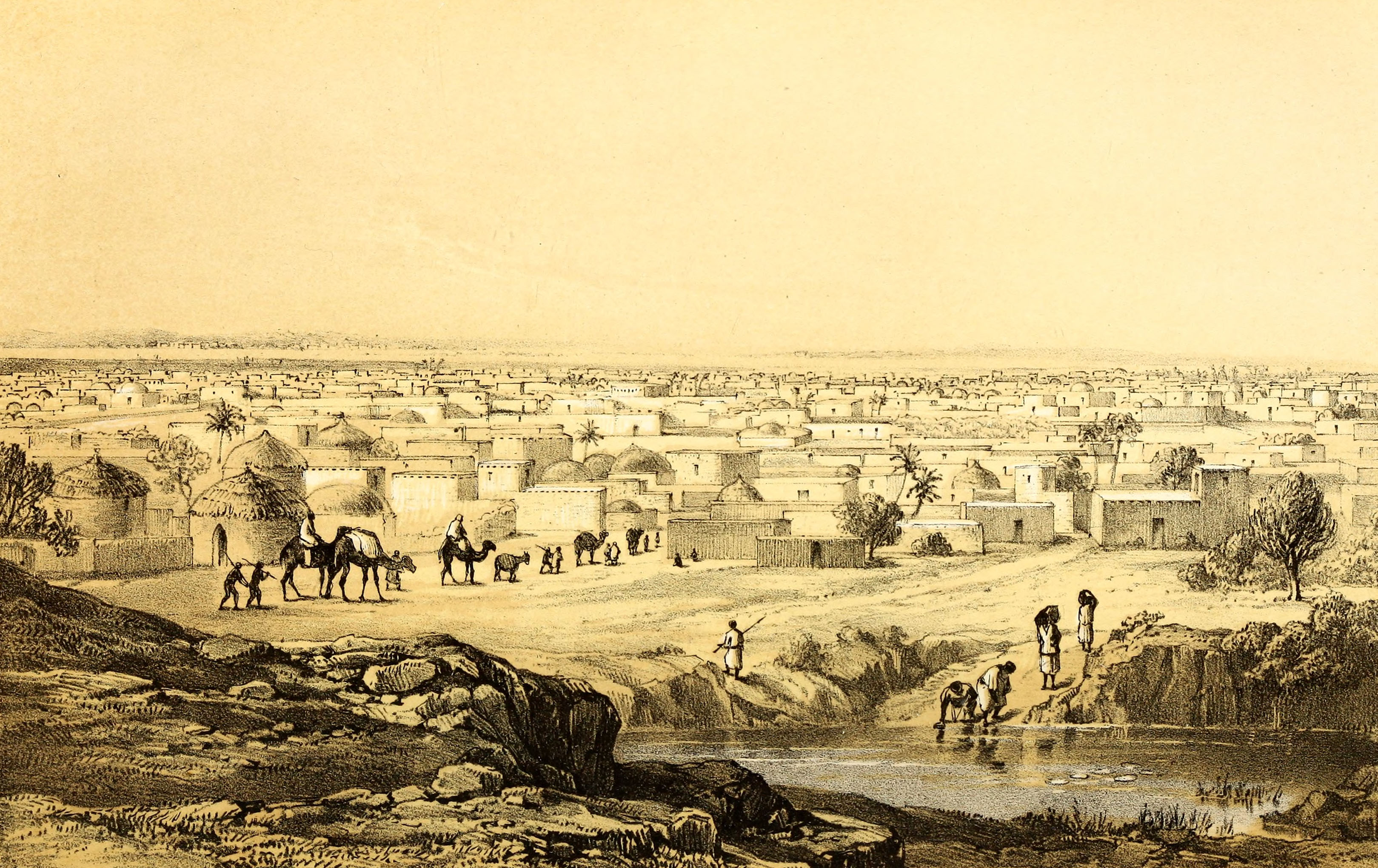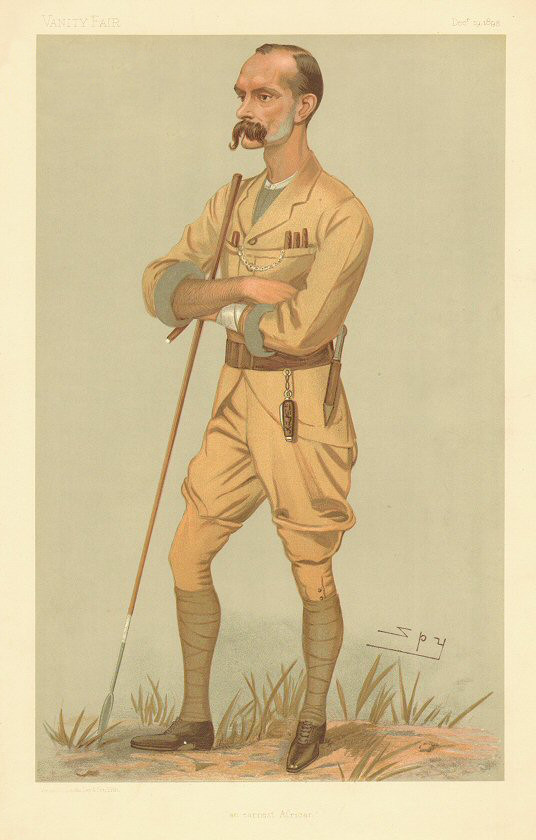|
Muhammadu Attahiru I
Muhammadu Attahiru I (died 1903) was the twelfth Sultan of the Sokoto Caliphate from October 1902 until March 15, 1903. He was the last independent Sultan of Sokoto before the Caliphate was taken over by the British. The Sokoto Caliphate leaders are partly Arabs and partly Fulani as stated by Abdullahi dan Fodio, brother of Usman dan Fodio who claimed that their family are part Fulani, and part Arabs, they claimed to be a descendant of the Arabs through Uqba ibn Nafi who was an Arab Muslim of the Umayyad branch of the Quraysh, and hence, a member of the family of the Prophet, Uqba ibn Nafi allegedly married a Fulani woman called Bajjumangbu through which the Torodbe family of Usman dan Fodio descended. Caliph Muhammed Bello writing in his book Infaq al-Mansur claimed descent from Prophet Muhammad through his paternal grandmother's lineage called Hawwa (mother of Usman dan Fodio), Alhaji Muhammadu Junaidu, Wazirin Sokoto, a scholar of Fulani history, restated the claims of Shaykh ... [...More Info...] [...Related Items...] OR: [Wikipedia] [Google] [Baidu] |
Abdur Rahman Atiku
Abdur Rahman Atiku ( ar, عبد الرحمن أتيكو) sometimes known as, Abdu or Abd al-Rahman bin Atiku was Sultan of Sokoto from 1891 to 1902. In earlier vacancies, he had been a contender from the house of Atiku, but the house had been passed over three times since the death of Ahmadu Rufai in 1873. Abubakar Na Rabah, Mu'azu and Umaru bin Ali subsequent Sultans after Rufai were from the house of Muhammed Bello. Life Following the death of Umaru bin Ali while he was on campaign in Kaura Namoda, an emergency meeting was called by the Waziri because as long as the enemy were near, it was imperative for the army to have a leader. During the meeting, Abdur Rahman, the son of Abu Bakr Atiku was chosen as Sultan. He was a brother of both Ahmadu Atiku and Umar Nagwamatse and a nephew of Muhammed Bello. Prior to becoming Sultan, he held the title of Bunu in charge of the village of Dambiso, north of Wurno. Abdur Rahman was unpopular during his reign and at the time the ... [...More Info...] [...Related Items...] OR: [Wikipedia] [Google] [Baidu] |
Mandé Peoples
The Mandé peoples are ethnic groups who are speakers of Mande languages. Various Mandé speaking ethnic groups are found particularly toward the west of West Africa. The Mandé Speaking languages are divided into two primary groups: East Mandé and West Mandé. The Mandinka or Manding (Malinke, Bambara and Dioula), a western branch of the Mandé, are credited with the founding of the largest ancient West African empires. Other large Mandé speaking ethnicities include the Soninke and Susu as well as smaller ethnic groups such as the Ligbi, Vai, and Bissa. Mandé speaking people inhabit various environments, from coastal rainforests to the sparse Sahel. They have a wide range of cuisines, cultures, and beliefs, and are organized mainly by their language group. Today they are predominantly Muslim and follow a caste system. Islam has played a central role in identifying the Mandé speaking people who originate and live in the Sahel regions the Mandinka and Soninke who ha ... [...More Info...] [...Related Items...] OR: [Wikipedia] [Google] [Baidu] |
Tomb Of Muhammadu Attahiru I
The tomb of Muhammad Attahiru I, the 12th Sultan of Sokoto, who ruled between October 1902 to March 1903 was once an attractive tourist centre. The tomb is located in Mbormi, four kilometres from Bajoga, Gombe State Gombe State ( ff, Leyddi Gommbe 𞤤𞤫𞤴𞤣𞤭 𞤺𞤮𞤥𞥆𞤦𞤫) is a state in northeastern Nigeria, bordered to the north and northeast by the state of Borno and Yobe, to the south by Taraba State, to the southeast by Adamawa State ..., Nigeria. History 118 years ago, the Sokoto Caliphate, Muhammad Attahiru I protested over the arrival of British troops in the area. He decided to leave Sokoto for Medina and he eventually stopped at Mbormi to make use of the advantage of its defensive walls to fight the British Army. A war that led to the end of his reign. The town of Mbormi had been deserted from the day Sultan Atahiru I and his two sons were killed in an intense battle fought by the trio and their over 600 followers against the British forces. ... [...More Info...] [...Related Items...] OR: [Wikipedia] [Google] [Baidu] |
The Guardian
''The Guardian'' is a British daily newspaper. It was founded in 1821 as ''The Manchester Guardian'', and changed its name in 1959. Along with its sister papers ''The Observer'' and ''The Guardian Weekly'', ''The Guardian'' is part of the Guardian Media Group, owned by the Scott Trust. The trust was created in 1936 to "secure the financial and editorial independence of ''The Guardian'' in perpetuity and to safeguard the journalistic freedom and liberal values of ''The Guardian'' free from commercial or political interference". The trust was converted into a limited company in 2008, with a constitution written so as to maintain for ''The Guardian'' the same protections as were built into the structure of the Scott Trust by its creators. Profits are reinvested in journalism rather than distributed to owners or shareholders. It is considered a newspaper of record in the UK. The editor-in-chief Katharine Viner succeeded Alan Rusbridger in 2015. Since 2018, the paper's main news ... [...More Info...] [...Related Items...] OR: [Wikipedia] [Google] [Baidu] |
Gombe, Gombe
''Gombe'' (Fula: Gelle/Wuro Gombe 𞤺𞤫𞥅𞤤𞥆𞤫/𞤱𞤵𞥅𞤪𞤮 𞤺𞤮𞤥𞤥𞤦𞤫) is the capital city of Gombe State, north-eastern Nigeria, with an estimated population of 261,536. The city is the headquarters of Gombe State, a traditional city that covers most of Gombe State. The major spoken languages in Gombe are Hausa and Fulfulɗe, Tera and Tangale. Recent development in the state includes the establishment of new International Conference Center, Gombe under the administration of the former Governor of the state, Ibrahim Hassan Dan-kwambo and inaugurated by the president of Nigeria, ably represented by his vice, Prof. Yemi Osinbajo on 27th of may 2019, opening of the new Gombe Lawanti International Airport in 2008 and state-wide street solar installation. Population Gombe State is populated by the Fulani people, constituting more than half of the state's population. Other ethnic groups include the Bolewa, Tera, Waja, and Hausa people. The L ... [...More Info...] [...Related Items...] OR: [Wikipedia] [Google] [Baidu] |
Mbormi Battle Ground
Mbormi Battle Ground is an historical site near Nafada in Gombe State, Nigeria. It is the site of a 1903 battle in which Muhammadu Attahiru I, the Sultan of the Sokoto Caliphate, was killed alongside many of his people. The site embodies the fight and resistance against colonial rule. Three tombs lie on the battle ground, and the site attracts many visitors. History Muhammadu Attahiru I, the 12th Sultan of the Sokoto Caliphate, fled from the invasion of British forces who sought to conquer the caliphate and put it under the control of the colonial government. The Sultan was fleeing to Madina as instructed by his grandfather Usman Danfodio for fear of an invasion. While on his way to Madina, he stopped at Mbormi for some days, and in this period, a British attack on July 27, 1903, led to the battle and killings. The Sultan's death marked the end of the Sokoto Caliphate and the creation of the Sokoto Sultanate, which was then controlled by the colonial government. Many descendan ... [...More Info...] [...Related Items...] OR: [Wikipedia] [Google] [Baidu] |
Kano (city)
Kano (Ajami: كانو) is a city in northern Nigeria and the capital of Kano State. It is the second largest city in Nigeria after Lagos, with over four million citizens living within ; located in the Savanna, south of the Sahel, Kano is a major route of the trans-Saharan trade. The city has been a trade and human settlement for millennia. It is the traditional state of the Dabo dynasty who since the 19th century have ruled as emirs over the city-state. Kano Emirate Council is the current traditional institution inside the city boundaries of Kano, and under the authority of the Government of Kano State. The city is one of the medieval Hausa seven kingdoms and the principal inhabitants of the city are the Hausa people. Centuries before British colonization, Kano was strongly cosmopolitan with settled populations of Arab, Berber, Tuareg, Kanuri and Fula and remains so with the Hausa language spoken as a lingua-franca by over 70 million speakers in the region. Islam arrived i ... [...More Info...] [...Related Items...] OR: [Wikipedia] [Google] [Baidu] |
Zamfara
Zamfara (Hausa: Jihar Zamfara Fula: Leydi Zamfara 𞤤𞤫𞤴𞤣𞤭 𞤶𞤢𞤥𞤬𞤢𞤪𞤢) is a state in northwestern Nigeria. The capital of Zamfara state is Gusau and its current Governor is Bello Matawalle. Until 1996, the area was part of Sokoto State. Zamfara is a densely populated area with the Hausa and Fulani peoples. The Zamfarawa mainly in Anka, Gummi, Bukkuyum and Talata Mafara Local Governments areas. Gobirawa populated Shinkafi Local Government. Gobirawa actually migrated from the Gobir Kingdom. Burmawa are found in Bakura and Fulani peopled Bungudu, Maradun, Gusau and are scattered all over the State. In Chafe, Bungudu and Maru, most are mainly Katsinawa, Garewatawa and Hadejawa. While, Alibawa people are located at Kaura Namoda and Zurmi, the Alawan Shehu Usmanu Fulani's are found in Birninmagaji. It is bordered to the north by the Republic of the Niger, to the south by Kaduna State, to the east by Katsina State, and to the west by the states of Soko ... [...More Info...] [...Related Items...] OR: [Wikipedia] [Google] [Baidu] |
Northern Nigeria Protectorate
Northern Nigeria (Hausa: ''Arewacin Najeriya'') was a British protectorate which lasted from 1900 until 1914 and covered the northern part of what is now Nigeria. The protectorate spanned and included the emirates of the Sokoto Caliphate and parts of the former Bornu Empire, conquered in 1902. The first High Commissioner of the protectorate was Frederick Lugard, who suppressed slavery and tribal raiding and created a system of administration built around native authorities. The Protectorate was ended on 1 January 1914, when its area was unified with the Southern Nigeria Protectorate and the Lagos Colony, becoming the Northern Province of the Colony and Protectorate of Nigeria. Foundation The Berlin Conference of 1884 and 1885 provided the area that would become the Northern Nigeria Protectorate to the British. The Royal Niger Company was formed in 1886 with George Taubman Goldie as the vice governor. The Company moved in-land and negotiated trade agreements and political ... [...More Info...] [...Related Items...] OR: [Wikipedia] [Google] [Baidu] |
Mahdi
The Mahdi ( ar, ٱلْمَهْدِيّ, al-Mahdī, lit=the Guided) is a Messianism, messianic figure in Islamic eschatology who is believed to appear at the Eschatology, end of times to rid the world of evil and injustice. He is said to be a descendant of Muhammad who will appear shortly before the Prophets in Islam, prophet Jesus in Islam, ʿĪsā (Jesus) and lead Muslims to rule the world. Though the Mahdi is not referenced in the Quran, and is absent from several List of hadith Books, canonical compilations of hadith – including the two most-revered Sunni hadith collections: ''Sahih al-Bukhari'' and ''Sahih Muslim'' – he is mentioned in other Hadith, hadith literature. The doctrine of the mahdi seems to have gained traction during the confusion and unrest of the religious and political upheavals of the first and second centuries of Islam. Among the first references to the Mahdi appear in the late 7th century, when the revolutionary Mukhtar al-Thaqafi, Mukhtar ibn Abi Uba ... [...More Info...] [...Related Items...] OR: [Wikipedia] [Google] [Baidu] |
Hijra (Islam)
The Hijrah or Hijra () was the journey of the Islamic prophet Muhammad and his followers from Mecca to Medina. The year in which the Hijrah took place is also identified as the epoch of the Lunar Hijri and Solar Hijri calendars; its date equates to 16 July 622 in the Julian calendar. The Arabic word ''hijra'' means "departure" or "migration", among other definitions. It has been also transliterated as Hegira in medieval Latin, a term still in occasional use in English. Early in Muhammad's preaching of Islam, his followers only included his close friends and relatives. Following the spread of his religion, Muhammad and his small faction of Muslims faced several challenges including a boycott of Muhammad's clan, torture, killing, and other forms of religious persecution by the Meccans. Toward the end of the decade, Abu Talib, Muhammad's uncle, who supported him amidst the leaders of Mecca, died. Finally, the leaders of Mecca ordered the assassination of Muhammad, which was ... [...More Info...] [...Related Items...] OR: [Wikipedia] [Google] [Baidu] |
Frederick Lugard, 1st Baron Lugard
Frederick John Dealtry Lugard, 1st Baron Lugard (22 January 1858 – 11 April 1945), known as Sir Frederick Lugard between 1901 and 1928, was a British soldier, mercenary, explorer of Africa and colonial administrator. He was Governor of Hong Kong (1907–1912), the last Governor of Southern Nigeria Protectorate (1912–1914), the first High Commissioner (1900–1906) and last Governor (1912–1914) of Northern Nigeria Protectorate and the first Governor-General of Nigeria (1914–1919). Early life and education Lugard was born in Madras (now Chennai) in India, but was brought up in Worcester, England. He was the son of the Reverend Frederick Grueber Lugard, a British Army chaplain at Madras, and his third wife Mary Howard (1819–1865), the youngest daughter of Reverend John Garton Howard (1786–1862), a younger son of landed gentry from Thorne and Melbourne near York. His paternal uncle was Sir Edward Lugard, Adjutant-General in India from 1857 to 1858 and Permanent Under- ... [...More Info...] [...Related Items...] OR: [Wikipedia] [Google] [Baidu] |







